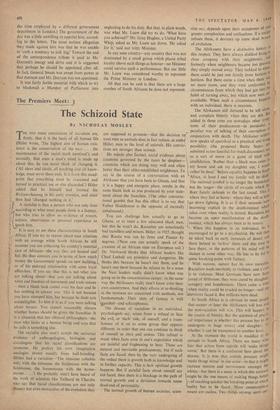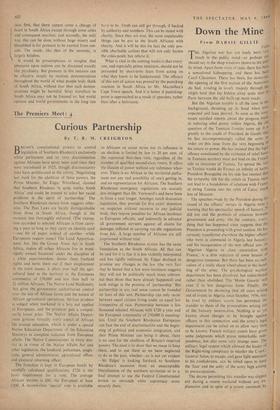The Premiers Meet: 3
The Schizoid State
By NICHOLAS MOSLEY rritE two main convictions of racialism are, firstly, that it is the basis of all human life (Hitler wrote, The highest aim of human exis- tence is the conservation of the race . . . the maintenance of the racial stock unmixed); and secondly, that once a man's mind is made up about this, he can never think of changing it. ('All ideas and ideals, all teaching and all know- ledge, must serve these. ends. It is from this stand- point that everything must be examined and turned to practical use or else discarded.') Hitler added that he himself had formed his Weltanschauung in his early twenties, and since then had 'changed nothing in it.'
.! 1 A racialist is thus a person who not only lives according to what most people think is a fantasy, but who tries to allow no evidence of reason, .« science, observation or personal experience to touch him.
i- ,I It is easy to see these characteristics in South il Africa. If you try to reason about race relations 1 , with an average white South African he still It
il!
Ic fed. He thus answers you in terms of how much money the Government spends on new building, or of his paternal relationship with some loyal office-boy. If you say that this is not what you are talking about—that you are talking about votes and freedom of movement and trade unions 1- —then a blank look comes over his face and he has nothing to answer you. This is not because you have stumped him, but because he finds yoU unintelligible. To him it is as if you were talking about horses. You cannot reasonably discuss whether horses should be given the franchise. It is a situation that has silenced philosophers—the man who looks at a human being and says that he calls it something else.
The racialist also won't accept the universal evidence of anthropologists, biologists and cociologists that his racial classifications are nonsense. He prefers his own imaginative analogies drawn usually from bull-breeding. (Hitler had a variation—'The titmouse cohabits only with the titmouse, the fieldmouse with the fieldmouse, the housemouse with the house- mouse. . . .') He probably won't have heard of the work of scientists like Teilhard de Chardin who say that racial classifications are not only illusory but even destructive of the evolution they are supposed to promote—that the decision to( treat men as animals does in fact reduce, as under Hitler, men to the level of animals. His convic- tions are stronger than science.
He rejects also factual, social evidence about countries governed by the races he despises— countries which are doing very well and often better than their older-established neighbours. To say in the course of a conversation with an Afrikaner that you have been to Ghana, and that it is a happy and energetic place, results in the same blank look as was produced by your state- ment about the franchise. (The other conversa- tional gambit that has this effect is to say that Father Huddleston is the opposite of mentally unbalanced.) You can challenge him actually to go to Ghana," or to meet a few educated black men, but this he won't do. Racialists are notoriously bad travellers and mixers. Hitler, in 1925, thought that Russia was run by -Jews and France by negroes. (`Now one can actually speak of the creation of an African state on European soil.') Dr. Verwoerd thinks that African leaders like Chief Luthuli are primitive and dangerous. He thinks this because he .hasn't met them, and he hasn't met them because he refuses to. In a sense the Nazi leaders really didn't know what was going on in the concentration camps: in the same way the Afrikaners really don't know even their own countrymen. And their efforts at re-thinking at the moment are concerned with methods, not fundamentals. Their state of fantasy is well arded—and schizophrenic.
The disease of racialism in an individual, psychologists say, arises from a refusal to face the evil, or 'dark' side, of oneself, and a trans- ference of it on to some group that appears different, in order that one can continue to think of oneself as elect and sinless. This refusal is made when facts arise in one's experience which are painful and frightening to bear. These are natural and inevitable predicaments; but if such facts are faced, then by the very undergoing of the ordeal there is growth both in knowledge and in further capacity. This is how spiritual growth happens. But if painful facts about oneself are not faced, then there is a blockage in the path of normal growth and a deviation towards some dead-end of personality.
The normal growth of human societies, scien- THE SPECTATOR. MAY 6. 196° tists say, depends upon their acceptance of ever greater complexities and unifications. If a socielY refuses these, it deviates up some dead branch of evolution. The Afrikaners have a distinctive history in this respect. They have always disliked living id, close company with their neighbours. anu formerly when neighbours became too pressing they simply moved away. They trekked to where there could be just one family from horizon l° horizon. But there came a time when there was no more room, and they were confronted " circumstances from which they had got into the habit of turning away, but which now were Inv avoidable. When such a circumstance halWebs with an individual, there is neurosis. The Afrikaners still demand to be left aWne,' and complain bitterly when they are not. nu' added to these cries are nowadays other Will? toms of their predicament—in particular. $ peculiar way of talking of their convictions in conjunction with death. The Afrikaner seldon1 now speaks of apartheid as a practical and livitIS possibility (the proposed Bantu States 3re, admitted as too fanciful for much discussion). as a sort of move in a game of bluff "ith annihilation. 'Rather than a black man come ti!
‘mb my house and ask my daughter out, I wu rather be dead.' 'Before equality happens in South Africa, at least 1 and my family will be &add: The national symbol is no longer the homestea but the laager—the circle of ox-carts which the Boer family defends to the last round. This where they feel at home: where they will at leas' tgo down fighting. It is as if their neurosis were becoming 'explicit in the death-instinct which takes over when reality is denied. Racialism h35 become an open manifestation of the cloth' instinct, which has always been at its source. When this happens in an individual, he IS encouraged to go to a psychiatrist. He will the° be taken back to early instances of denial and there helped to 're-live' them and this time ld face them; or the patterns of his mind will be shaken in some other way. He has to be led t° wme breaking-point with fantasy. With nations, nature has its own remedies. acialism leads inevitably to violence, and a cure ts in violence. Most Germans have now heell . ured of Hitlerism; they were cured by slaughter' savagery and hopelessness. There came a tiine (whenwhen reality could be evaded no longer—and the reality faced it. But millions were dead. In South Africa is is obvious to most peoPle, that sooner or later the Afrikaners will lose anu the non-racialists will win. This will happen ill the course of history. But the question of practt. cal importance is whether this process has to be undergone in huge misery and slaughter Lit whether it can be transposed to another level. At the moment the world is muddled ill itS attitude to South Africa. There are many fear that action from outside will 'make thing's worse.' But there is a confusion here about the disease. It is true that outside pressure might 'make things worse' in one sense—in that it met increase tension and nervousness amongst the whites—but there is a sense in which this increase \___ might be the one means of making things better of reaching quicker the breaking-point at which reality has to be faced. More commonplace means are useless. Two things anyway seem cer" lain; first, that there cannot come a chauge of heart in South Africa except through some crisis and consequent reaction; and secondly, the only way this can be done without huge misery and bloodshed is for pressure to be exerted from out- side. The inside, like that of the neurotic, is \ largely helpless. It would be presumptuous to imagine that pressures upon nations can be discussed exactly like psychiatry. But pressure in this instance can be effective simply by resolute demonstrations throughout the world of what people truly think of South Africa, without fear that such demon- strations might be harmful. Stray travellers in South Africa may not be listened to; but world opinion and world governments in the long run have to be. Truth can still get through, if backed by authority and numbers. This can be stated with charity. Since they are true, the most unpalatable things can be put to the South Africans with 'charity. And it will be this (in fact the only pos- sible charitable action) that will not only hasten the crisis-point, but relieve it.
What is vital in the coming weeks is that every- one, and especially prime ministers, should not be prevented by short-term fears from acting on what they know to be fundamental. The efficacy of this sort of action was proved by the panicking reaction in South Africa to Mr. Macmillan's Cape Town speech. And it is better if panicking- point is approached as a result of speeches, rather than after a holocaust.







































 Previous page
Previous page